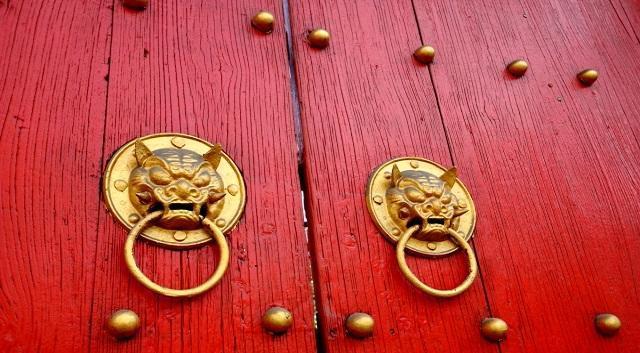When China was talking about "beijingers in New York" 20 years ago, no one would have guessed that more than 20 years later, Chinese people would be talking about "foreigners in China." Today, Americans are moving to China and settling down, and so are the Japanese, the Germans, the Australians, and so on. Under the background of globalization, many foreigners have entered China and become foreign immigrants in China.

A foreign child is full of curiosity about ancient Chinese architecture.
The great rejuvenation of China's economy is not only exciting to the overseas Chinese, but also a large number of foreigners are rushing to China. For example, according to the Blue Book of the China International Immigration Report (2015), China is the third most attractive destination after Switzerland and Singapore. The number of foreigners emigrating to China is clearly on the rise, although it is negligible compared with the U.S. immigration figures. They moved to major cities in the eastern coastal areas to find or have professional jobs.
According to public information, as at March 2016, at least 900 thousand foreigners lived in China. According to public information, at least 900,000 foreigners were living in China by March 2016, compared with 525,000 in 2010. In 2016, 1576 foreigners were granted permanent residence in China, an increase of 163% over the previous year. According to public information, the total number of people who received Chinese green CARDS was 7,356 between 2004 and 2013.
In those days, a stragrid foreigner doing business in China was just like a duck in water. But now that the threshold for the Chinese market is accelerating, it is unlikely to achieve a handy success in the Chinese market. If you happen to be a non-bilingual and bi-cultural foreigner who wants to do business in the mainland of China, it is even more difficult.
For example, a foreigner who evaluates China's achievements, Hurun, the "single-handed" foreigner who broke into China's wealth circle. In the humble business atmosphere of Confucius and Mencius, who are not accustomed to "revealing the scenery" in China, using his "rich list" to become the darling of public opinion. In the seventeen years, he became a brand that even children knew. This is used to evaluate foreigners in China, and finally to feed themselves.
Now, China's economy is making the world boil. They believe that a timid person can't be an international entrepreneur. But it is a risk with potentially high returns. If you try and don't succeed, at least you'll learn something. Here are five things to do before coming to China to do business, according to the Atlantic.

A door in the ancient architecture of Beijing
1.Doing what you are good at and familiar with will make you more successful. China has a huge population base and relatively scarce resources. Starting a business in China will be the top of your life.
2.Looking for a trustworthy local partner, China has always been a human society, and so is the company. The best partners you can work with are from universities like Qinghuabei University, or have worked for Chinese Internet giants like Ali and Tencent. But McKinsey Co Asia Pacific chairman, Gordon don't think the relationship can create a successful business. The development of successful business requires products of technology, efficiency, anticipation and quality.
3. Introducing a more transparent and elite-oriented European and American corporate culture into enterprises, the entrepreneurial atmosphere in China is quite enthusiastic. The rigid management system and the dug of competitors will make the turnover rate of employees very high.
4. Most Chinese are reluctant to face foreigners directly, even the Shanghai people who are most friendly to foreigners. Use your advantage to find a way to soft landing. For example, go to a global Chinese business school and attend an entrepreneurship course tailored to the international community.
5. All foreign investors should pay attention to such a special problem: You can't sell the same goods and services in your country in China, so if you want to copy them, I suggest you reconsider your competitive advantage.

